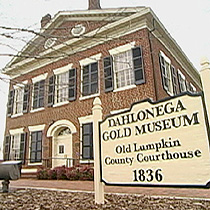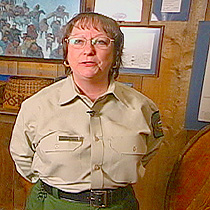-
(单词翻译:双击或拖选)
Washington, D.C.
05 July 2007
Two decades before the famed California gold rush in 1849, America's first gold rush occurred in the southeastern state of Georgia. This gold fever opened new frontiers, but nearly destroyed the Cherokee Indians. For producer Roger Hsu, VOA's Jim Bertel takes us to a place that was built and destroyed by the quest for gold.
 |
| The Dahlonega Gold Museum Historic Site |
Angela Johnson, site manager at Dahlonega Gold Museum Historic Site in Georgia, says this is how America's first gold rush began. "In 1828, Benjamin Parks was out deer hunting about six miles [10 kilometers] from here, stomped1 his toes on a rock the size of an egg. It's the color of gold," she says.
Dan Parks is the great grandson of Benjamin Parks. He guides tours to the Consolidated2 Gold Mine which, in its heyday3, was the largest gold mining operation east of the Mississippi River. "He said they got out in one day's time 54 pounds and 7 ounces of gold (25 kilograms),” says Parks. “That much gold was worth over $13,000."
 |
| Johnny Parker, tour guide and researcher |
Johnny Parker has been researching the history of the Georgia gold rush for more than 20 years. He guides underground mine tours. "Before we head underground I am going to give you a little history of the gold rush,” Parker tells a group of tourists. “The word Dahlonega means, 'land of the yellow metal,' or as a Cherokee word means, 'yellow rock.' You can just pick it up and put it in your pocket. Within one year's time, 15,000 miners were here. Fifteen thousand within one year's time in such a small area!"
Parker says, during the first wave of Georgia's gold rush between 1829 and 1839, gold worth tens of millions of dollars was mined. In its most prosperous days Consolidated Gold Mine employed up to 1200 miners.
However, Georgia's Gold Fever came at a price. Teresa Walker, a ranger4 at the New Echota Historical Site, says the Cherokee Indians, who had been granted the land by treaty, were forced to leave. "In the 1800s -- in 1830 -- Georgia decided5, and President Jackson decided, to move all the Cherokees from here to Okalahoma to open up the land for the Georgia settlers," Walker begins.
"The Cherokees are the only tribe that didn't give up their property. They held on, fighting for their right to live here, because they were here first."
 |
| Angela Johnson, site manager at Dahlonega Gold Museum Historic Site in Georgia |
However, Angela Johnson says their fight was in vain. The state of Georgia seized the Indians' land.
"They came here and surveyed out 4 million acres [1.6 million hectares], chopped it up to 40 acres [16 hectares] gold lots and 160 acres [64 hectares] farming lots,” says Johnson. “You had to qualify to get into the drawing. You had to be a Georgia resident for 3 years and you had to a white male 18 years old or older. And for 160 acres [64 hectares] you had to come up with $18."
The forced migration6 of the Cherokee Nation started in the winter of 1838.
"It turned out to be the worst winter in the recorded history up until that time,” says Walker. “So they were walking in six to eight foot [two to three meters] of snow from here to Oklahoma."
Walker says a total of 4,000 people, nearly one-fourth of the Cherokee population, died during the five-month trek7 west. The journey became known as the "trail of tears."
Back in Dahlonega, Dan Parks says the good times came to an end in 1906 when the price of gold dropped significantly. "After the gold rush there were probably 500 people here," he says.
"A lot of folks don't even know about gold in this area,” adds Parker. “They always hear about California, California. Even though the gold rush was a major thing, it was overshadowed by the bad part, which was the 'Trail of Tears'."
 收听单词发音
收听单词发音
1
stomped

|
|
| v.跺脚,践踏,重踏( stomp的过去式和过去分词 ) | |
参考例句: |
|
|
|
2
consolidated

|
|
| a.联合的 | |
参考例句: |
|
|
|
3
heyday

|
|
| n.全盛时期,青春期 | |
参考例句: |
|
|
|
4
ranger

|
|
| n.国家公园管理员,护林员;骑兵巡逻队员 | |
参考例句: |
|
|
|
5
decided

|
|
| adj.决定了的,坚决的;明显的,明确的 | |
参考例句: |
|
|
|
6
migration

|
|
| n.迁移,移居,(鸟类等的)迁徙 | |
参考例句: |
|
|
|
7
trek

|
|
| vi.作长途艰辛的旅行;n.长途艰苦的旅行 | |
参考例句: |
|
|
|















